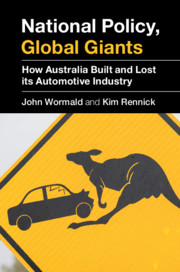
- Publisher:
- Cambridge University Press
- Online publication date:
- December 2019
- Print publication year:
- 2020
- Online ISBN:
- 9781108643948
- Subjects:
- Strategic Management, Management

What can we tell about the future of automobiles and the industries that make them by examining their past? Wormald and Rennick trace the history of powered land transport, the rise and fall of the railways, the spectacular rise of the automobile, and what might come next. Delving into the mighty and complex automotive industry, following the growth of the markets and production, this book illustrates the globalization of vehicle manufacturers and component suppliers, giving form to the development of the industry's business model. A key factor in an auto-industry's successes and failures is the often-difficult relationship it has with government, which varies in nature from country to country. As an illustrative case, Wormald and Rennick present and analyse the entire lifecycle of Australia's automotive history – including its birth, growth, functioning and death - and its shifting relationship with the government that supported it.
'Australia is a large country that relies on motor vehicles, to keep us all connected, working and living across this vast landscape. Wormald and Rennick have captured this Australian automotive vehicle dependent context, with evidence-based research. It is posited within the politics of government policies and reviews, that sought to support, but eventually lead to its demise. Our industrial and manufacturing sectors are in transition. Wormald and Rennick’s detailed chronicle of the automotive industry provides lessons for other sectors to learn from as we build new organisational capabilities to support our value-adding exports and sustain our sovereign security.'
Michael W. McLean - FAICD, FIMC-CMC, FAOQ, JM
'A formidable command of the industry, its makeup and its history born of the authors’ having lived and breathed it for decades. I discovered things I didn’t know about the period I wrote a Ph.D. about.'
Nicholas Gruen - CEO of Lateral Economics and architect of the Button Plan
 Loading metrics...
Loading metrics...
* Views captured on Cambridge Core between #date#. This data will be updated every 24 hours.
Usage data cannot currently be displayed.